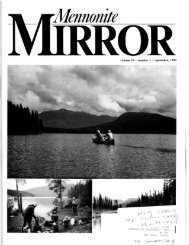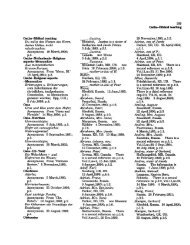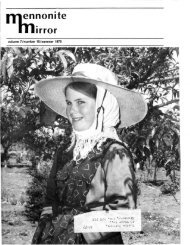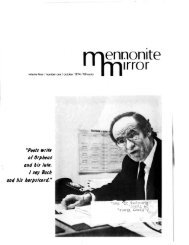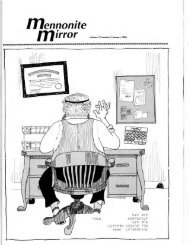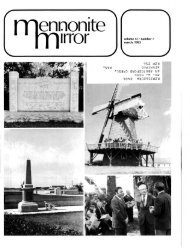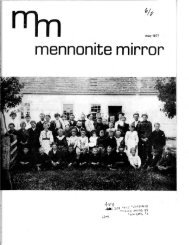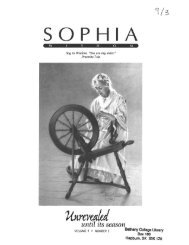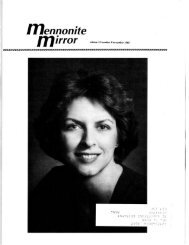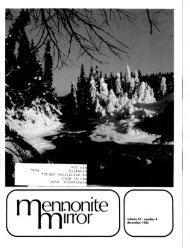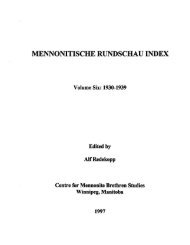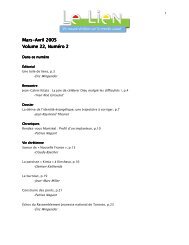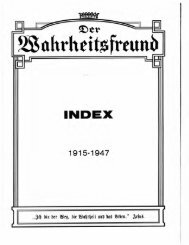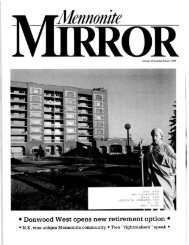number 8 - Canadian Conference of Mennonite Brethren Churches
number 8 - Canadian Conference of Mennonite Brethren Churches
number 8 - Canadian Conference of Mennonite Brethren Churches
Create successful ePaper yourself
Turn your PDF publications into a flip-book with our unique Google optimized e-Paper software.
volume 19/ <strong>number</strong> 8/ april, 1990
ForeWord<br />
One <strong>of</strong> the things you notice when driving around Winkler is the Triple E<br />
manufacturing plant. And then when you drive around on vacation, one is<br />
impressed at the <strong>number</strong> <strong>of</strong> Triple E vehicles on the highway. But Triple E's<br />
success did not · come easily. Hard work and sticking to the basics <strong>of</strong> the<br />
enterprise have paid <strong>of</strong>f in a business that continues to be very viable. In our<br />
opening article, Al Loeppky describes the company's progress.<br />
What constitutes the history <strong>of</strong> a people? James Urry in a reprint <strong>of</strong> his<br />
address to the Manitoba <strong>Mennonite</strong> Historical Society explores how <strong>Mennonite</strong>s<br />
have presented their history. He observes there is a varied range <strong>of</strong> history, and<br />
that their contribution to the overall picture varies as well. He goes on to<br />
observe that there is still much to uncover.<br />
Retirement is something many people discuss at great length, and some even<br />
manage to escape to the retirement havens. Al Reimer managed to spend some<br />
time in Arizona and discovered that there are some conventions that must be<br />
observed and concludes that he is perhaps "too young" to move there<br />
permanently.<br />
One hopes that marriages last forever. But they don't. Making a decision to<br />
end a marriage is difficult. In a short piece this issue, Myra Schell, describes<br />
how a decision to "walk out" restored a sense <strong>of</strong> worth.<br />
When tempted with an array <strong>of</strong> good food, they say the best way to get rid <strong>of</strong><br />
temptation is to give in. Edmund Stevens explores how he was "seduced" into<br />
buying a cinnamon bun by someone who knew his weakness.<br />
THE COVER: You don't have to travel to far distant lands to visit ruins, there<br />
are some in your own backyard. The Trappist Monastery in St. Norbert burned<br />
almost 10 years ago and then was rehabilitated into a stone ruin and provincial<br />
park. In summer it is a quiet haven on the banks <strong>of</strong> the LaSalle River on one<br />
side, and the open prairie on the other.<br />
<strong>Mennonite</strong> Mirror<br />
volume 191 <strong>number</strong> 8<br />
april, 1990<br />
Triple E: Modest beginnings,<br />
perseverence, and maturity / 5<br />
<strong>Mennonite</strong> popular culture: private<br />
lives and public images I 9<br />
A visit to geriatric paradise / 13<br />
Poet's word / 14<br />
Observed along the way / 1 5<br />
Review: Reflections <strong>of</strong> an Hispanic<br />
<strong>Mennonite</strong> / 1 8<br />
Word from down East / 19<br />
Words from Western mountains / 21<br />
Walking out restored sense <strong>of</strong> worth<br />
/22<br />
Temptation and giving in, and sweet<br />
experience / 23<br />
Manitoba news / 25<br />
Enn Hosefeld Woat Jefriet I 28<br />
Our Word: <strong>Mennonite</strong>s and the Forks<br />
/30<br />
<strong>Mennonite</strong> Mirror<br />
Publisher. Roy Vogt Editor: Ruth Vogt<br />
Managing Editor: Ed Unrau Associate Editors:<br />
AI Reimer. Harry loewen. Victor Doerksen.<br />
Mavis Reimer Writing Staff: Andre Oberle.<br />
Paul Redekop. Dana Mohr, J. Braun, Tim<br />
Wiebe, Sarah Klassen. Agnes Wall, Mary lou<br />
Driedger, George Epp. Vic Penner, Dora Dueck.<br />
Dora Maendel; Mirror Mix-Up, Bob Matsuo.<br />
<strong>Mennonite</strong> Literary Society Inc.<br />
President: Roy Vogt VICe-President: Ed Unrau<br />
Secretary: David Unruh Office Manager:<br />
Frieda Unruh Directors: Rudy Friesen. John<br />
Schroeder, Mavis Reimer.<br />
The <strong>Mennonite</strong> Mirror is normally published 10<br />
times each year for the <strong>Mennonite</strong> community<br />
<strong>of</strong> Manitoba by the <strong>Mennonite</strong> literary Society<br />
Inc.<br />
All business and editorial correspondence<br />
should be addressed to 207 - 1317 A Portage<br />
Avenue. Winnipeg, Manitoba, R3G OV3.<br />
Telephone 7 8 6 2 2 8 9. The <strong>Mennonite</strong><br />
Mirror observes the following part-time <strong>of</strong>fice<br />
hours: Monday 1 to 4 p.m.; Tuesday, 9 a.m.<br />
to 4 p.m.. Thursday. 9 a.m. to noon.<br />
Subscriptions: $20 for one year; no charge for<br />
those on pension.<br />
issn 315 - 8101<br />
Second Class<br />
Mail Registration: 2 6 5 8<br />
mennonite mirror / april, 1990 / 3
Modest beginnings, major upheavals<br />
and a lot <strong>of</strong> perseverence<br />
sees Triple E to maturity<br />
Coming into Winkler from the east on<br />
highway 14, one <strong>of</strong> the first things you<br />
notice is the Triple E motor home factory<br />
complex.<br />
Huge pale yellow and green metalclad<br />
buildings squat in the northeast<br />
corner <strong>of</strong> town. Motor homes sit here<br />
and there on gravel lots, waiting for<br />
finishing, inspection, or delivery.<br />
Some are protectively kept inside acres<br />
<strong>of</strong> chain link fencing, like cows in a<br />
pasture. The size <strong>of</strong> everything in this<br />
rural setting gives a feeling <strong>of</strong> permanence<br />
and security. Yet the short history<br />
<strong>of</strong> Triple E has been characterized<br />
by change more than anything else.<br />
In the winter <strong>of</strong> 1964, Winkler plumber<br />
P.W. Enns was on voluntary service<br />
in Elkhart, Indiana, a travel trailer<br />
manufacturing centre. Having built his<br />
own camper trailer at home, P.W. was<br />
interested enough to have a look at .<br />
Elkhart's trailer industry in his spare<br />
time. What caught his eye was a trailer<br />
chassis with a rubber ride suspension<br />
system. He made a few calls back to<br />
Winkler to talk to his son-in-law, Phil<br />
Ens, his partner in a plumbing business.<br />
He persuaded Phil to share the cost <strong>of</strong><br />
a trailer chassis with him. P.W. thought<br />
it might work to do plumbing in<br />
summer and make trailers in winter.<br />
That way they wouldn't have to lay<strong>of</strong>f<br />
summer workers. It was an unlikely<br />
combination, plumbing and trailer manufacturing,<br />
but worth a try.<br />
They signed away their homes and<br />
P.W.'s small farm as collateral, took<br />
out an option on one acre <strong>of</strong> land in the<br />
northeast corner <strong>of</strong> Winkler, and by fall<br />
they were in production, making 13foot<br />
travel trailers. Phil managed the<br />
plumbing while P. W. ran the trailer<br />
business. They were joined by Peter<br />
by AI Loeppky<br />
Elias, another <strong>of</strong> P.W.'s sons-in-law;<br />
together Enns, Ens, and Elias made the<br />
three E's for the company name.<br />
Getting started<br />
In 1965 P.W. went to the Federal Business<br />
Development Bank to ask for a<br />
$70,000 loan. When asked how much<br />
money he had, he explained that he had<br />
none, which was why he had come to<br />
the bank. They turned him down. The<br />
Winkler Credit Union provided the<br />
money as a character loan and financed<br />
Triple E's growth until the amount <strong>of</strong><br />
money going out and coming in became<br />
too much for a local credit union to<br />
handle. By that time the banks were<br />
anxious to do business.<br />
Triple E grew rapidly during the first<br />
years. Production increased from 97<br />
trailers the first year, to 327 the next,<br />
to 550 in the third year. Different<br />
styles and sizes <strong>of</strong> travel trailers were<br />
added. Montreal's Expo in 1967 boosted<br />
the demand for recreational vehicles,<br />
making it a good time to do<br />
business.<br />
In 1967 P.W. Enns bought a damaged<br />
Ford one-ton truck from an auto<br />
wrecker·and built his first motor home.<br />
Philipp R. Ens<br />
Triple E became the first <strong>Canadian</strong><br />
company to build motor homes on a<br />
production line basis.<br />
In 1968 P. W. wanted Phil to manage<br />
both businesses so that he could build<br />
prototypes. Phil argued that since that<br />
job would be too much for him, their<br />
best bet would be to sell the plumbing<br />
and heating business and only build<br />
recreational vehicles. P.W. agreed<br />
reluctantly, not liking the idea <strong>of</strong> giving<br />
up the original family business. Thus<br />
Triple E became an exclusively recreational<br />
vehicle industry.<br />
Until 1969 Triple E was, by its own<br />
admission, a small company growing<br />
too fast for the Enns family. It was<br />
operating with a large debt load and<br />
lacked the know-how to manufacture<br />
and sell on a large scale. In stepped<br />
B.C. business tycoon Jim Pattison and<br />
his company, Neonex Leisure Products.<br />
Pattison was buying travel trailer and<br />
motor home companies and the Triple E<br />
trailer factory looked like a good buy.<br />
He bought out the Enns family, paying<br />
10 per cent <strong>of</strong> the purchase price in<br />
cash and the rest in Neonex shares, held<br />
in escrow. The arrangement meant that<br />
if the new shareholders wanted to cash<br />
in their shares, they could only do so<br />
over a designated time period. The sale<br />
was a relief for P.W. and his sons-inlaw<br />
because they were able to pay<strong>of</strong>f<br />
their mortgages. Pattison retained the<br />
three original owners, Phil as company<br />
manager and P. W. as consultant. He<br />
also had an option to buy the motor<br />
home division, then owned by the original<br />
three, along with six other shareholders.<br />
National stage opens<br />
Neonex owned Triple E for four and a<br />
mennonite mirror / april, 1990 / 5
ottom-up it has been called. But one<br />
<strong>of</strong> the problems in attempting to include<br />
ordinary folk and their ways in history<br />
is that the sources are few, or so it<br />
would at first appear. Such people<br />
<strong>of</strong>ten lived in an oral, not a literate,<br />
world and left few traces <strong>of</strong> their <strong>of</strong>ten<br />
rich culture. Historians are hooked on<br />
documents and the published word and<br />
distrust other sources <strong>of</strong> information:<br />
oral traditions, surviving customs and<br />
material culture. Of course<br />
anthropologists are just the reverse.<br />
They distrust the printed word and<br />
prefer oral traditions and artifacts. In<br />
recent years anthropologists and<br />
historians have come together to<br />
examine the rich subject <strong>of</strong> popular<br />
culture as opposed to <strong>of</strong>ficial culture,<br />
low culture instead <strong>of</strong> high culture.<br />
Can these ideas usefully be applied to<br />
<strong>Mennonite</strong> history? I think so.<br />
The French sociologist Pierre<br />
Bourdieu has suggested that popular<br />
culture consists <strong>of</strong> what the common<br />
people like, simple pleasures,<br />
something which would "satisfy the<br />
taste for revelry, plain speaking and<br />
hearty laughter." Now that sounds like<br />
<strong>Mennonite</strong>s to me! At least when Low<br />
German is abroad in the privacy <strong>of</strong> their<br />
own homes or gatherings. Of course I<br />
know <strong>Mennonite</strong>s like to present a<br />
public face <strong>of</strong> a dour, hard-working<br />
pious people who, as the American<br />
critic Mencken once described<br />
puritan/protestants, attempt to prove<br />
that God is a bore. But behind the<br />
public mask has long existed something<br />
else. <strong>Mennonite</strong>s in church at worship<br />
can be contrasted with <strong>Mennonite</strong>s in<br />
the vestibule afterwards; <strong>Mennonite</strong>s<br />
opening yet another monument to either<br />
their pioneer or martyr history with the<br />
delights <strong>of</strong> Faspa and bawdy Low<br />
German evenings where few .outsiderscan<br />
ever know what really is going on.<br />
Wilder past?<br />
In the past things were even more<br />
colourful. <strong>Mennonite</strong>s danced, sang<br />
dirty ditties, joked .outrageously,<br />
distilled and drank alcohol, and smoked<br />
tobacco. There was a rich underworld<br />
<strong>of</strong> gritty sayings, <strong>of</strong> .oral insult and<br />
innuendo. The only thing <strong>Mennonite</strong>s<br />
10/ mennonite mirror / april, 1990<br />
did not d.o, as many contemporary<br />
commentators noted, was "cuss" (at<br />
least in public). And from their<br />
essentially peasant agrarian past they<br />
brought with them all kinds <strong>of</strong> other<br />
local customs and beliefs about work<br />
and play (mumming for instance),<br />
disease and death, healing and healthideas<br />
and customs <strong>of</strong>ten built on<br />
superstition and belief in the forces <strong>of</strong><br />
darkness. But how <strong>of</strong>ten are these<br />
popular manifestations <strong>of</strong> <strong>Mennonite</strong><br />
private lives discussed in <strong>Mennonite</strong><br />
histories? <strong>Mennonite</strong> "healers" are<br />
occasionally mentioned, but the<br />
complex cosm.ologies which lie behind<br />
their practice have rarely been<br />
examined. In fact we know more about<br />
<strong>Mennonite</strong> popular culture thanks to<br />
recent <strong>Mennonite</strong> writers <strong>of</strong> fiction than<br />
through the work <strong>of</strong> <strong>Mennonite</strong><br />
historians.<br />
N.ot all agrarian<br />
Not all these aspects <strong>of</strong> popular culture<br />
were derived from a distant agrarian,<br />
peasant past. In Russia the<br />
establishment <strong>of</strong> the Forestry Service<br />
proved to be fertile ground for the<br />
invention <strong>of</strong> new traditions. The young<br />
men conscripted into the forest camps<br />
developed and later handed on a bizarre<br />
set <strong>of</strong> rituals and customs. Recruits<br />
were initiated into the new community<br />
by passing thr.ough rites in which they<br />
were humbled and humiliated; young<br />
men struck strange deals <strong>of</strong> brotherhood<br />
in which they exchanged sisters in mock<br />
engagements, establishing imaginary<br />
affinal links . What else went on is now<br />
left to the imaginati.on, but life in the<br />
camps was a strange mockery <strong>of</strong> normal<br />
<strong>Mennonite</strong> existence where the mixture<br />
<strong>of</strong> genders and the reality <strong>of</strong> birth, sex<br />
and death were open for all to see.<br />
Instead they were a cross between an<br />
English public school and a monastic<br />
retreat. Again the story <strong>of</strong> popular life<br />
in the Forestry camps has been told<br />
through literature, most strikingly in<br />
Arnold Dyck's writings, rather than in<br />
the "histories" <strong>of</strong> alternative service in<br />
Russia.<br />
The point is that such c.oncerns are<br />
n.ot <strong>of</strong> minor importance. In the past<br />
<strong>Mennonite</strong> life was more oral, more<br />
localised, less affected by .outside<br />
culture due to their separation from the<br />
world and, dare I say it, m.ore vulgar<br />
than today (even in the rem.oter rural<br />
areas <strong>of</strong> Canada). Vulgar that is by the<br />
standards <strong>of</strong> modem, polite high<br />
culture. Herein lies part <strong>of</strong> the problem<br />
for modem <strong>Mennonite</strong>s: they have<br />
distanced themselves from the actual<br />
lives <strong>of</strong> their ancestors through either<br />
the acquisition <strong>of</strong> polite culture, .or very<br />
open evangelical religion or both. Most<br />
<strong>Mennonite</strong>s are interested in geneal.ogy<br />
and feel a deep sense <strong>of</strong> affinity with<br />
their ancestors, but they undoubtedly<br />
would find their ancest.ors quite<br />
intolerable if they could actually meet<br />
them face to face today. And the<br />
ancestors no d.oubt in tum would reject<br />
their descendants and their ways. The<br />
past is not just an.other country, it is a<br />
world inhabited by aliens.<br />
Famil and kinshi<br />
Y p -<br />
It would appear that <strong>Mennonite</strong>s tended<br />
to live in two worlds. One was<br />
dominated by community and<br />
c.ongregation, the public face <strong>of</strong> the<br />
private, separated <strong>Mennonite</strong> way. The<br />
second was the world <strong>of</strong> family, kinship<br />
and friends dominated in Russia by the<br />
village. This was more private, or at<br />
least with degrees <strong>of</strong> privacy increasing<br />
towards the -family unit and familial<br />
relations. Each world had its own<br />
separate ways. The congregational<br />
community prepared <strong>Mennonite</strong>s for<br />
their ultimate salvation, for the next<br />
world. But family and kinship were <strong>of</strong><br />
this world, not the next. Only in recent<br />
times have couples been buried under<br />
the same headstone and adjacent to<br />
family and kin in graveyards. The idea<br />
seems to be that the <strong>Mennonite</strong> social<br />
structure will be recreated in the next<br />
world. In the old days individuals were<br />
buried in rows as they died and without<br />
headstones. One hoped to meet one's<br />
maker face to face alone on the day <strong>of</strong><br />
judgment. Obviously family life was to<br />
be experi(!nced only here on earth. But<br />
<strong>of</strong> course we know so little about<br />
Menn.onite popular belief, as against<br />
<strong>of</strong>ficial dogma, that one cannot be<br />
certain about this.<br />
What is interesting is that many <strong>of</strong>
the rituals <strong>Mennonite</strong>s associate today<br />
with church were not church events in<br />
the past. Marriages were not held in<br />
church but usually in the houses or<br />
barns <strong>of</strong> the bride or groom. Funerals<br />
likewise were held in homes and barn;<br />
the dead· never went through a church<br />
on their way to the grave. Of course a<br />
minister was always present and there<br />
was a ritual aspect to these important<br />
life-cycle events, but the occasions were<br />
seen primarily as family and community<br />
affairs rather than congregational. And<br />
<strong>of</strong> course events could get out <strong>of</strong> hand<br />
once the minister had departed! The<br />
life <strong>of</strong> popular culture took over with a<br />
vengeance with either celebrations or a<br />
hearty wake. Eventually such events<br />
were "reigned in" by the ministers.<br />
Funerals were brought into the church<br />
and weddings, at least in Russia after<br />
the 1880s, through the standardizing <strong>of</strong><br />
the Schlusselbund and the Polterabend.<br />
Even so the religious leaders kept a<br />
careful eye on proceedings. In 1910<br />
the General <strong>Conference</strong> in Russia issued<br />
instructions for the supervision <strong>of</strong> the<br />
Polterabende, insisting that they be<br />
upright and "pure."<br />
Preachers and teachers<br />
The attempt to subordinate aspects <strong>of</strong><br />
domestic "ritual" and its links with<br />
popular culture by religious authorities<br />
was a common trend across Europe<br />
among both Catholics and Protestants<br />
during the nineteenth century. But<br />
there were others who launched attacks<br />
on the popular customs <strong>of</strong> the common<br />
people, most notably schoolteachers, the<br />
civilizing arm <strong>of</strong> the secular state.<br />
School teachers were the harbingers <strong>of</strong><br />
high culture, those charged with<br />
transforming rural peasants into citizens<br />
<strong>of</strong> the nation, shifting their loyalties<br />
from family and neighbourhood to the<br />
state and its institutions. In the Russian<br />
<strong>Mennonite</strong> world this process took on<br />
an additional force in that the leading<br />
ministers were <strong>of</strong>ten teachers by<br />
training or pr<strong>of</strong>ession, the teacherpreachers<br />
as I have called them<br />
elsewhere.<br />
As <strong>Mennonite</strong>s began to associate<br />
increasingly with the "world", the<br />
public face <strong>of</strong> Mennonitism shifted to<br />
incorporate a wider universe. The<br />
public world now went well beyond the<br />
congregational-community to include<br />
non-<strong>Mennonite</strong>s. On the one hand,<br />
Russian <strong>of</strong>ficialdom and nobles had to<br />
be impressed with <strong>Mennonite</strong><br />
achievements and culture, on the other<br />
hand Little Russian peasants had to be<br />
shown that <strong>Mennonite</strong>s were not just<br />
socially but also culturally superior. So<br />
high culture, religious conformity,<br />
social status and allegiance to the state<br />
all became neatly bound together into a<br />
single attempt to build <strong>Mennonite</strong><br />
culture on a new, modern base.<br />
New behavior code<br />
Civilized manners, middle-class<br />
morality and a desire to emulate the<br />
high culture <strong>of</strong> the wider world now<br />
became the "correct" way. Dress codes<br />
altered (tailored and styled clothes<br />
replaced the old rough peasant dress -you<br />
can see this clearly in<br />
photo graphs) ,eating habits changed (fine<br />
china, the knife, the fork and the<br />
serviette were substituted for the spoon<br />
and bowl) and polite conversation in<br />
Russian or High German, sitting stiffly<br />
upright in a carpeted room took the<br />
place <strong>of</strong> rural yokels, lounging on a<br />
bench spitting sunflower seeds onto a<br />
wooden floor while sharing witticisms<br />
in Low German. And these new airs<br />
and graces were to be learnt in the<br />
classroom, under central supervision, as<br />
an adjunct to literacy; popular culture<br />
by contrast was learnt in the home, in<br />
the barn, in the fields and was<br />
pr<strong>of</strong>oundly oral. In fact the clash<br />
between High German (and Russian and<br />
later English) and Low German was<br />
one <strong>of</strong> the battlegrounds in what became<br />
the suppression <strong>of</strong> <strong>Mennonite</strong> popular<br />
culture, with its roots in the <strong>Mennonite</strong><br />
agrarian past. For behind all these<br />
moves lay the transformation <strong>of</strong><br />
<strong>Mennonite</strong> society into modern,<br />
industrialized life.<br />
In Canada the great divide between<br />
the Kanadier and the RussHinder which<br />
was so apparent through the inter-war<br />
period was largely a measure <strong>of</strong> how<br />
successful the <strong>Mennonite</strong>s in Russia had<br />
been in civilizing the <strong>Mennonite</strong><br />
peasantry after 1880. Not that the<br />
Kanadier had remained stationary in the<br />
New World since the 1870s, wallowing<br />
in their agrarian past. But in Canada<br />
the European pretensions <strong>of</strong> the Old<br />
World, with its high culture and a class<br />
mentality were less apparent and the<br />
<strong>Mennonite</strong>'s isolation from the world<br />
on the grounds <strong>of</strong> faith was reinforced<br />
by the frontier.<br />
For many RussHinder settled in<br />
Canada in the 1920s high culture (High<br />
German, choir singing and various<br />
customs associated with Christmas,<br />
marriages and other events) came to be<br />
seen as essential to <strong>Mennonite</strong> identity<br />
as religion. Some Russllinder therefbre<br />
were convinced that the Kanadier had<br />
somehow lost these essential cultural<br />
traits in emigration and in the hardships<br />
<strong>of</strong> pioneering the prairie frontier. For<br />
the Russllinder to think otherwise<br />
would have meant admitting that once<br />
they too had shared the popular culture<br />
<strong>of</strong> the Kanadier and that their beloved<br />
high culture had been acquired since the<br />
1870s and was not essential to "being"<br />
<strong>Mennonite</strong>.<br />
Changing culture<br />
But popular culture was already on the<br />
wane in the <strong>Mennonite</strong> world in Canada<br />
before 1920. In many cases the<br />
Kanadier's world <strong>of</strong> popular culture was<br />
not neatly transformed into concerns<br />
with high culture through a combination<br />
<strong>of</strong> religion and education led by a<br />
cultural elite as it had been for the<br />
Russllinder. Instead, the old was<br />
challenged and rejected in the name <strong>of</strong><br />
evangelical religion and the<br />
transformation was <strong>of</strong>ten much more<br />
violent and shattering. The cycle <strong>of</strong><br />
tent-revivalism which like some firestorm<br />
burnt across rural <strong>Mennonite</strong><br />
communities challenged and negated<br />
much <strong>of</strong> <strong>Mennonite</strong> popular culture:<br />
drinking, dancing, smoking, singing<br />
and other customs were condemned as<br />
evil and were to be totally abandoned.<br />
In a sense the evangelical revival<br />
movements can be seen as one aspect <strong>of</strong><br />
the American way <strong>of</strong> civilizing,<br />
engendering middle-class values,<br />
shifting old ties <strong>of</strong> kin and community<br />
to new shibboleths <strong>of</strong> the open market.<br />
The "saved" individual becomes the<br />
mennonite mirror I april, 1990 I 11
Believe me, friends, I'm not trying to<br />
flatter myself. I hear the ominous<br />
creaking <strong>of</strong> Time's chariot as clearly as<br />
the next person. Not to mention the<br />
even louder creaking <strong>of</strong> my ageing<br />
joints and sinews when I get up in the<br />
morning. I'm a grizzled cock and no<br />
spring chicken. I admit rn never see<br />
this side <strong>of</strong> 60 again. And it's becoming<br />
more and more difficult to maintain<br />
my long-standing boast that I'd rather<br />
be the age I am than any age 1've been.<br />
But I have to teU you that I'm not<br />
quite ready to retire to a trailer camp<br />
for senior citizens in the desert landscape<br />
<strong>of</strong> Arizona. I've just returned<br />
from two weeks in one <strong>of</strong> those geriatric<br />
Shangri-las in Mesa, and a sobering<br />
experience it was. Don't get me<br />
wrong. I have nothing against senior<br />
citizens, especially "snowbirds" from<br />
the frozen north, migrating south for<br />
the winter to hot sun and heated pools.<br />
Mesa <strong>of</strong>fers a marvellous environment<br />
for people seeking to escape or at least<br />
slow down the cruel encroachments <strong>of</strong><br />
advancing age. It's just that personally<br />
I don't feel quite ready to embrace that<br />
particular life style.<br />
The trailer life<br />
And Happy Valley Trailer Village, I<br />
found, has a very well-defined life<br />
style. The trailers, amazingly habitable<br />
and roomy, sit cheek by jowl on neat,<br />
miniature streets under the gently fanning<br />
palm trees and the relentless sun.<br />
You've got to be a least 45 to live there<br />
and most <strong>of</strong> the roughly 3,000 inhabitants<br />
meet that requirement by a comfortable<br />
margin. In the midst <strong>of</strong> the<br />
Village there is a huge Activity Centre<br />
with two spacious swimming pools -the<br />
"warm" pool and the "cold" pool.<br />
It took my leathery northern skin several<br />
days to detect the thermal difference<br />
between a warm pool heated to 87<br />
degrees and a cold pool at 84 degrees.<br />
Needless to say, the warm pool is the<br />
more popular <strong>of</strong> the two. It is domi-<br />
A Visit to Geriatric Paradise<br />
by AI Reimer<br />
nated by what I call the "bobbers and<br />
weavers." The bobbers, mostly stately<br />
ladies <strong>of</strong> a certain age, stand at rigid<br />
military attention in the pool and bob up<br />
and down for exercise -- for hours at a<br />
time. The weavers, even more energetic,<br />
stand with arms akimbo weaving<br />
from side to side in the water simulating<br />
the aerobic exercises you see on<br />
TV.<br />
I tried to escape the 90 + heat by<br />
cooling <strong>of</strong>f in the warm "cold" pool<br />
while dreaming <strong>of</strong> tingling Manitoba<br />
lake water in July. Every few minutes<br />
a well-insulated lady or gentleman<br />
would plunge in beside me and exclaim<br />
loudly how refreshing the water <strong>of</strong> the<br />
cold pool was. When not in the pools<br />
these hardy souls don wide-brimmed<br />
hats and broil themselves voluntarily in<br />
the great microwave oven <strong>of</strong> the sky.<br />
Those who aren't in the pool area are<br />
busy doing other things such as square<br />
dancing in the Activity Hall, playing<br />
shuffleboard outside or golf on one <strong>of</strong><br />
the many courses nearby. Even the<br />
golf courses are designed for retirees,<br />
that is, the holes are short with lots <strong>of</strong><br />
par threes and not many hazards.<br />
Ideal, I must confess, for a short hitter<br />
like me -- flattering, in fact, when you<br />
can shoot in the 80s on them after having<br />
trouble breaking 100 on the lengthy<br />
beasts at home.<br />
To fit into the trailer park scheme <strong>of</strong><br />
things, you must follow certain conventions<br />
<strong>of</strong> social behaviour. Single ladies.<br />
who greatly out<strong>number</strong> the single men,<br />
tend to form their own social groups.<br />
Many <strong>of</strong> these ladies are remarkably<br />
well preserved and look twenty years<br />
younger than they are. Married couples<br />
enjoy a special status and socialize<br />
mainly with each other. Eating out is a<br />
favourite pastime and everybody clips<br />
the restaurant coupons <strong>of</strong>fering special<br />
dinner deals from the papers. Restaurant<br />
dinners are preceded by drinks at<br />
somebody's trailer, usually limited to<br />
one mild gin and tonic or an anemic rye<br />
and Sprite. If you order wisely at the<br />
restaurant you can usually take home a<br />
doggy bag that will provide your lunch<br />
next day. The ladies spend countless<br />
hours analyzing menus and dishes and<br />
can tell you exactly what they had for<br />
dinner at Happy Harry's last Tuesday.<br />
And to maintain an active social life<br />
you must play bridge or cribbage.<br />
Stay-at-homes paint or do crafts, <strong>of</strong>ten<br />
becoming amazingly pr<strong>of</strong>icient at them<br />
as the frequent bazaars in the Activity<br />
Hall prove in abundance.<br />
Mobile Nirvana<br />
Operations and diseases are favourite<br />
topics <strong>of</strong> conversation, but death is a<br />
taboo subject to be avoided -- like sex<br />
and other anti-social behaviour. Some<br />
<strong>of</strong> the medical marvels here are hard to<br />
believe. Twice I golfed with a retired<br />
pr<strong>of</strong>essor who has only half a lung. He<br />
carried his own golf bag around the<br />
course and beat me both times we played.<br />
He has been that way for over a<br />
decade, which was welcome news to<br />
my wife who is herself convalescing<br />
from recent lung surgery.<br />
For most people the trailer park "season"<br />
lasts from October-November to<br />
April-May. Time slips by agreeably<br />
with all these activities and life becomes<br />
a kind <strong>of</strong> mobile Nirvana. By seven<br />
a.m. the park citizens are out in droves<br />
for their morning walks. They go by in<br />
all shapes and sizes with happy faces<br />
and cheery "hi's." After a while you<br />
take them for granted. A couple <strong>of</strong><br />
days before returning home I attended a<br />
spring training ball game in Phoenix<br />
and found myself staring at young<br />
people as though they were aliens from<br />
outer space.<br />
Ah well, in another 10 years I may<br />
be ready for this leisurely southern life<br />
style. All I need to do then is perfect<br />
my bobbing and weaving technique and<br />
learn to present coupons in restaurants<br />
without blushing, and I'll be in business<br />
in Geriatric Paradise. mm<br />
mennonite mirror / april, 1990 / 13
Adam's Poem<br />
I opened my eyes this morning<br />
The day belonged to me<br />
I saw my blanket and I saw my Mom and Dad.<br />
Then I saw the bus and all the kids on the bus.<br />
And then I saw the school and I considered<br />
Stopping the world right there making the day<br />
Go on and on forever, but I decided not to<br />
I let the world spin on and I went to school.<br />
I almost did it but then I said to myself<br />
Who knows what you might be missing tomorrow?<br />
Springchild<br />
It has been winter so long<br />
the crocus in the snow<br />
releases its song with a cry<br />
a beat <strong>of</strong> blood<br />
surging up through white skin<br />
a blossom <strong>of</strong> pain<br />
this life regained.<br />
Light doggedly twisting round a tree<br />
finds my face<br />
and makes a revelation<br />
<strong>of</strong> every hair bone lash<br />
I wince from the scrutiny<br />
the hidden skin laid open<br />
a secret unsheathed<br />
this newest-green <strong>of</strong> me<br />
My song once spun its notes<br />
in winter's womb<br />
quivering now in the resurrection air<br />
like a naked child<br />
still feeling the fire <strong>of</strong> her birthing<br />
It has been winter so long<br />
and I am ready for my naming<br />
for the light embracing<br />
skyward straining<br />
breath <strong>of</strong> sun<br />
that tells me<br />
I am Spring<br />
14/ mennonite mirror / april, 1990<br />
THE POET'S WORD<br />
--Adam Verwymeren,<br />
grade 3, WMES<br />
-- Jennifer Friesen<br />
Good Friday<br />
Here is creation revisited<br />
death a beginning once more<br />
in this garden<br />
this s<strong>of</strong>t-sun paradise<br />
<strong>of</strong> crackling leaf soon to be new upon the tree<br />
<strong>of</strong> winter-thin squirrel spring-skittering<br />
over tombstones<br />
<strong>of</strong> the old with their canes<br />
slowly bending to greet awakened earth<br />
with some token<br />
be it a flower<br />
or a smile for an empty crypt<br />
Here is creation revisited<br />
the stone is rolled away<br />
in this garden<br />
this tear filtered cemetery<br />
where one monument stands<br />
cast not in stone but flesh<br />
a gardener who calls my name<br />
and asks me to plant no more flowers<br />
but to take the blossom<br />
<strong>of</strong> his scarred hand<br />
Here<br />
now<br />
is creation revisited<br />
and death is swallowed in life.<br />
-- by Jennifer Friesen
A year<br />
<strong>of</strong> looking<br />
in the<br />
Mirror?<br />
By subscribing to the Mirror<br />
you will receive an edition 10<br />
times year and see more <strong>of</strong> the<br />
magazine that tries to take a<br />
comprehensive look at what<br />
<strong>Mennonite</strong>s in Manitoba, and<br />
elsewhere, are doing.<br />
Gift subscriptions are welcome,<br />
and the names and addresses<br />
should be listed on another<br />
sheet.<br />
The current subscription rate<br />
for 10 issues a year is $20 for<br />
one year.<br />
Send your cheque or money<br />
order to:<br />
<strong>Mennonite</strong> Mirror<br />
207-1317 A Portage Avenue<br />
Winnipeg, Manitoba<br />
R3G ova<br />
name<br />
address<br />
city/town<br />
postal code<br />
18/ mennonite mirror / april, 1990<br />
REVIEW<br />
Reflections<br />
<strong>of</strong> an Hispanic<br />
<strong>Mennonite</strong><br />
reviewed by Bernie Wiebe<br />
Jose Ortiz's story from his conversion<br />
in Puerto Rico to his present administrative<br />
position within the <strong>Mennonite</strong><br />
Church bureaucracy is both encouraging<br />
(that there is such a story) and somewhat<br />
disconcerting (he reveals some <strong>of</strong><br />
the painful paradoxes between <strong>Mennonite</strong><br />
practices versus our confessions).<br />
It is a story we must hear and need to<br />
learn from, because it is one <strong>of</strong> those<br />
unusual circumstances where an Hispanic<br />
<strong>Mennonite</strong> speaks to us candidly<br />
about what it means to become "one <strong>of</strong><br />
us. "<br />
I'm not aware <strong>of</strong> many autobiographies<br />
written by two authors and still<br />
conveying a unified believable narrative.<br />
Yet, somehow, Ortiz and Graybill<br />
manage it and do it well.<br />
This book is important for several<br />
reasons: 1 ) We have not had enough<br />
<strong>Mennonite</strong>s from other than Russo<br />
Germanic-Swiss-Dutch backgrounds<br />
write about their pilgrimages among us.<br />
2) Not only does Ortiz (and his shadow,<br />
Graybill) articulate some <strong>of</strong> the unique<br />
details about the covert obstacles presented<br />
by <strong>Mennonite</strong> ethnicity; he also<br />
calls for some specific adjustments. A<br />
striking illustration <strong>of</strong> this is in chapter<br />
13 where Graybill reflects on Ortiz's<br />
observation that "if we cannot get new<br />
converts, that says our faith is just a<br />
folk religion." Graybill then advocates<br />
for Ortiz that <strong>Mennonite</strong>s should be less<br />
concerned about eliminating differences<br />
and more actively pursue an appreciation<br />
<strong>of</strong> variety.<br />
Ortiz compares the new <strong>Mennonite</strong><br />
mosaic to a multi-ethnic meal ("Pennsylvania<br />
Germans bring meat loaf,<br />
home fries and rhubarb pies; African<br />
Americans bring greens, black -eyed<br />
peas, pork and cornbread; Mexicans<br />
bring jalapeno peppers and enchiladas;<br />
and Puerto Ricans bring arroz con<br />
polIo, platanos and piragua" (p 74).<br />
Who can deny or resist the desirability<br />
<strong>of</strong> such a model? Each group helps<br />
to make the meal more "truly a foretaste<br />
<strong>of</strong> heaven" (p 74) .<br />
Traditional <strong>Mennonite</strong>s need to read<br />
this book. It is a rare "window" on<br />
what it may require for us to break<br />
down our own dividing walls that keep<br />
other people from joining us in the<br />
<strong>Mennonite</strong> faith pilgrimage.<br />
Ortiz exhibits a keen awareness <strong>of</strong><br />
the challenges facing all Christians in<br />
our contemporary world. He sees the<br />
need to recognize the potential tyranny<br />
<strong>of</strong> technology (on computers, etc. pp<br />
59-63); and the need to speak the faith<br />
in language and symbols <strong>of</strong> our culture<br />
(p 84).<br />
To this reviewer it was also a rare<br />
encouragement to see "Canada" specifically<br />
mentioned and included in Jose<br />
Ortiz's challenge (p 11).<br />
Ortiz, Jose and David Graybill, Reflections<br />
<strong>of</strong> an Hispanic <strong>Mennonite</strong>, (1989,<br />
GoodBooks, Intercourse, PA 17534,92<br />
pages).<br />
Bernie Wiebe teaches at Menno Simons<br />
College.<br />
MENNONITE BRETHREN<br />
COLLEGIATE INSTITUTE<br />
Invites applications for the following<br />
position beginning September, 1990:<br />
FRENCH to immersion students in<br />
junior and senior high, part-time.<br />
Openings are also expected in<br />
other subjects, including English,<br />
French, German, physical education,<br />
Biblical studies, counselling, science.<br />
-- Grades 7 -1 2<br />
-- 488 students from a wide<br />
interchurch community<br />
-- 30 teachers<br />
-- expanding curriculum and student<br />
body.<br />
Send applications and resumes to:<br />
Dave Teigrob, Principal, 180 Riverton<br />
Avenue, Winnipeg, R2L 2E8.
WORDS FROM THE WESTERN MOUNTAINS<br />
Rain and prairie visitors <strong>of</strong>ten arrive together,<br />
and they don't complement each other<br />
The fog drifts in with an eerie quietness,<br />
obscuring sights, muffling sounds,<br />
settling in low lying areas and extending<br />
till everything is obliterated. Traffic<br />
problems, whether on highways or in<br />
the air, are silently and quickly created.<br />
The air becomes heavy; for some people<br />
breathing becomes difficult as<br />
pollution is trapped and held by the fog.<br />
Fog disconnects people from their environment;<br />
it hides people. If the late<br />
morning sun burns it <strong>of</strong>f it will be a<br />
beautiful clear day, at least till late<br />
afternoon when the pattern repeats<br />
itself. Unless it rains.<br />
Rain is the dominant feature <strong>of</strong> west<br />
coast winter, lIlore common than fog.<br />
It rains continuously. Newcomers no<br />
longer believe there are mountains<br />
behind all that mist, hidden for weeks<br />
by low clouds, fog and limited visibility.<br />
On a clear autumn day the fresh<br />
snow on the mountain tops is a truly<br />
spectacular sight; on the rainy days <strong>of</strong><br />
winter the mountains are not to be seen.<br />
Fog, rain, and rare sunshine are continuously<br />
in the forecast. A recent<br />
winter month actually had FOUR days<br />
without rain, a cause for celebration.<br />
No prayer for them<br />
Rain and prairie visitors are not the<br />
subject <strong>of</strong> prayer petitions since both<br />
will arrive in B.C., <strong>of</strong>ten unscheduled,<br />
without seeking Divine intervention.<br />
They <strong>of</strong>ten arrive together, providing<br />
prairie visitors with ample cause to<br />
complain about the unending rain.<br />
Days <strong>of</strong> low clouds and incessant drizzle<br />
are typical winter fare, like the<br />
gentle rain prairie farmers wait for after<br />
putting in the crops. The forceful<br />
downpour accompanying prairie thunderstorms<br />
that can, in a very short<br />
period, deposit a monthly supply <strong>of</strong><br />
precipitation for a farm is uncommon<br />
here. Locals actually stop and look<br />
about when a rare thunder clap is<br />
heard.<br />
The umbrella, common as the snow<br />
shovel in the prairies, replaces the winter<br />
coat; lined winter shoes give way to<br />
rubber overshoes. Commuters to Vancouver,<br />
even on clear mornings, carry<br />
their umbrellas, knowing the clouds<br />
with their accompanying downpour will<br />
sneak over the mountains without fail.<br />
Dreaming <strong>of</strong> a white garden<br />
A Norris cartoon features a bewildered<br />
BCer shovelling the rare wet snow as<br />
his wife sits at the window, penning a<br />
letter to relatives in Winnipeg. "Weather<br />
is fine here, Fred's just outside<br />
digging in the garden." Such stories<br />
have resulted in locals being accused <strong>of</strong><br />
exaggerating accounts <strong>of</strong> balmy winters.<br />
The rain season falls between October<br />
and March and the amounts vary<br />
with each area. Vancouver receives<br />
about 154 cm <strong>of</strong> rain per year, Victoria<br />
about half as much. Areas closer to the<br />
mountains receive more rain. White<br />
Rock, near the USA-Canada border has<br />
by H.W. Friesen<br />
the lowest amount <strong>of</strong> rainfall in the<br />
Vancouver-Lower Mainland area.<br />
Snow is rare; Vancouver has a six per<br />
cent chance <strong>of</strong> a white Christmas.<br />
Summers, to the surprise <strong>of</strong> many, can<br />
be dry; Vancouver has more sunny days<br />
in summer than many <strong>Canadian</strong> cities.<br />
More complaints<br />
The human condition is characterized<br />
by complaints about the weather, and<br />
grumbling about rain is not uncommon<br />
here. Some ex-prairie grumblers with<br />
a wealth <strong>of</strong> experience in the art complain<br />
not only about the rain, but also<br />
about the absence <strong>of</strong> the clear prairie<br />
nighttime sky as well as lack <strong>of</strong> northern<br />
lights, obscured by either humidity<br />
or surface lights.<br />
Of those who retire to BC, some<br />
move around the province, and some<br />
leave the province, because <strong>of</strong> the weather.<br />
There are newcomers who find<br />
the constant winter rain depressing;<br />
preferring sunny prairie weather, even<br />
at -25C. Life consists <strong>of</strong> more than<br />
scenery and climate and the BC weather<br />
is not tolerated by all.<br />
Winter, such as it is, does not last<br />
long. Weather here is moderate and<br />
not given to the extremes our prairie<br />
cousins suffer. Roses in the garden in<br />
November and daffodils coming up in<br />
February make it quite endurable. If<br />
you don't mind the rain. mm<br />
mennonite mirror / april, 1990 /21
NO one ever expects to get divorced,<br />
certainly not <strong>Mennonite</strong> couples who<br />
take their vows "till death us do part"<br />
seriously. But it does happen and the<br />
guilt and pain for both partners can be<br />
overwhelming.<br />
I entered my marriage knowing that<br />
my life would now be devoted to caring<br />
for, and being a helpmate to, my husband.<br />
Women born in the 30s knew<br />
this was their role-they would get married<br />
(heaven help them if they stayed an<br />
old maid!) raise a family and enjoy<br />
being a grandmother in their twilight<br />
years. The only pr<strong>of</strong>essions open to<br />
them otherwise were nursing and teaching.<br />
We hadn't been married long when I<br />
realized that even though I still kept<br />
working part-time I had lost control<br />
over any decisions made. I handed<br />
over my pay cheque automatically because<br />
it would make him love me more,<br />
right? Wrong! Being so obedient only<br />
made things worse because I was resentful,<br />
seething inside while he became<br />
more domineering-not a good set-up for<br />
a happy marriage.<br />
Work as escape<br />
The children came along in quick succession<br />
and I loved motherhood but<br />
found myself carrying around inside a<br />
heaviness emotionally that never seemed<br />
to lift. I was still working part-time<br />
and the only time the darkness lifted<br />
was when I was at work where I knew<br />
I was a capable person.<br />
I didn't realize I had allowed my selfworth<br />
to evaporate completely. While<br />
I was trying to please my husband I had<br />
22 I mennonite mirror / april, 1990<br />
Walking out was difficult,<br />
but it restored a sense <strong>of</strong> worth<br />
by Myra Schell<br />
allowed him to take total control <strong>of</strong> my<br />
life, telling me where I should go and<br />
when, keeping me short <strong>of</strong> money, and<br />
if I would disagree with any <strong>of</strong> his<br />
decisions I would be treated with a cold<br />
disapproval which I couldn't bear. So<br />
I did whatever I could to prevent this<br />
coldness. However, the tension in the<br />
house was palpable and I <strong>of</strong>ten took my<br />
unhappiness out on my children. This<br />
is what I regret the most. We were<br />
totally unable to discuss this, I being<br />
too afraid and he not considering it<br />
necessary. By now I was convinced<br />
that I was quite stupid, rather unattractive,<br />
and extremely lucky to have snared<br />
such an intelligent, talented man. That<br />
was a crock.<br />
Building to parting<br />
This husband <strong>of</strong> mine was not a monster<br />
and he never physically abused me.<br />
He is a charming, friendly man to all<br />
who meet him, like many other men<br />
who psychologically and emotionally<br />
abuse their wives.<br />
Many things led up to the change in<br />
me that gave me the courage to leave.<br />
There had been many, many marriage<br />
counsellors (he did agree to the first<br />
one because a good female friend arranged<br />
it) but their advice would only<br />
last a short time and we would be back<br />
in the same old rut. By now I knew<br />
that our problems weren't all my fault<br />
but it took at least 15 years <strong>of</strong> marriage<br />
for me to get this far.<br />
So finally, 22 years after we had<br />
exchanged vows, I left with my youngest<br />
daughter who was 11. The other<br />
children were all away from home by<br />
that time and I had come to the point<br />
where I knew I would lose my sanity if<br />
I stayed any longer. I was having counselling<br />
which helped me to make the<br />
decision.<br />
Exhilaration<br />
To be on one's own after so many years<br />
is scary. That and the guilt you feel<br />
because you know you're a failure as a<br />
wife. But it is also a heady experience<br />
as you realize you are capable <strong>of</strong> making<br />
good decisions and you are a good<br />
money manager. The first time the<br />
bank gave me a loan to buy a car, I was<br />
so thrilled-I knew I was going to make<br />
it.<br />
There is no easy answer for women,<br />
and sometimes men, in such an unhappy<br />
marriage. The death <strong>of</strong> love due<br />
to abuse is all too frequent. But I have<br />
found that women seem to have an<br />
inherent strength that allows us to survive<br />
against terrible odds, a strength<br />
that enables us to reach out and <strong>of</strong>fer<br />
support and empathy to others in pain.<br />
There have been a lot <strong>of</strong> tears, a lot<br />
<strong>of</strong> prayers, and a lot <strong>of</strong> counselling for<br />
me but it has now been six years, my<br />
husband has remarried, and I feel good<br />
about myself as a woman, as a mother,<br />
as a friend, as a sexual being, and as a<br />
capable pr<strong>of</strong>essional.<br />
My faith has always remained firm<br />
but any false piety or religious fanaticism<br />
leaves me cold. There is no honesty<br />
in that and if I have learned nothing<br />
else in this life's journey I have<br />
learned the need for honesty in relationships.<br />
mm
I met the devil tonight. And, like so<br />
many men before me, I fell. I fell<br />
hard, and, looking back, I am amazed<br />
at how I walked into it, so open-eyed,<br />
knowing every moment what was happening,<br />
what I was doing, and knowing<br />
full well that even the smallest token <strong>of</strong><br />
resistance could save me. Yet I fell,<br />
faster and easier than an over-ripe apple<br />
from a tree.<br />
The fact is, she was beautiful. Her<br />
black, shoulder-length hair, her brown<br />
skin, her dark and mysterious eyes,<br />
these embodied all <strong>of</strong> the exotic wonders<br />
<strong>of</strong> India. The air around her was<br />
rich with spice and sweetness. And she<br />
was selling. There was no uncertainty,<br />
no hesitancy; there was not even any<br />
embarrassment, no half-apologetic<br />
smile. It was a simple fact and, somehow,<br />
a fact beyond judgment or condemnation.<br />
I knew it even before our<br />
eyes met. She was selling. And what<br />
she was selling was cinnamon buns.<br />
. No single event<br />
The story <strong>of</strong> this fall, as the story <strong>of</strong> so<br />
many others, is best begun thus, in<br />
medias res, but we must now pan back<br />
to view the· wider scene, to take in the<br />
context, to learn the pre-history <strong>of</strong> this<br />
story. My fall did not take place in a<br />
single moment, though so it seemed. It<br />
was not a simple event, isolated from<br />
the rest <strong>of</strong> my life, somehow outside the<br />
stream <strong>of</strong> my whole existence. No<br />
event in any life is simple; no story<br />
begins cleanly without ties to the past,<br />
to some hidden time before story begins.<br />
No, this was not a simple event<br />
When temptation speaks<br />
giving in can be<br />
a sweet experience<br />
by Edmund Stevens<br />
in a discrete moment: no, my fall took<br />
nearly a week.<br />
It began with c<strong>of</strong>fee<br />
It began last Thursday evening, with a<br />
different but also lovely lady. As I<br />
wandered around the familiar mall, that<br />
paradise where modem children grow<br />
up and where modem men find shelter<br />
from winds and from time, as I looked<br />
about for a moment's amusement, pausing<br />
in the shops with perhaps some<br />
unconscious hope <strong>of</strong> a redemption, I<br />
stopped to buy a c<strong>of</strong>fee at my usual<br />
counter. As I turned to find a seat,<br />
who should I see, passing among 'the,<br />
nearby shops, but a dear old friend,<br />
Eveline. I caught her eye and waved;<br />
she came across and said that she'd be<br />
happy to join me, but she would buy<br />
her c<strong>of</strong>fee at another shop -- at the<br />
cinnamon bun counter -- for, she said,<br />
with a passion and sincerity which<br />
allowed no questioning, no uncertainty,<br />
"They serve the best c<strong>of</strong>fee in the<br />
mall."<br />
There is another lady, and another<br />
. meeting, <strong>of</strong> which you should be aware<br />
if you are to understand my story. My<br />
history is filled with meetings, with<br />
comings, goings, encounters, greetings.<br />
I have been seeing another young lady<br />
regularly, a dietician by pr<strong>of</strong>ession. I<br />
do not love her, and she accepts this; I<br />
am certain <strong>of</strong> this, though we do not<br />
speak <strong>of</strong> it. Yet she continues to ask<br />
me to see her, at least once every few<br />
weeks, and, like a man who cannot·<br />
admit to himself that an affair has lost<br />
its thrill, I go back whenever she asks.<br />
She weighs me in her balance, and<br />
she finds that I am not yet wanting.<br />
She scolds me for growing fat, but I do<br />
not point at her thighs. I do not scold<br />
her in return, but I swallow my words<br />
and choke on my tongue. She abuses<br />
me, yet I promise, each time, that I will<br />
come again, that I will be scolded again<br />
and say nothing, that I will submit to<br />
the judgment <strong>of</strong> her unjust scales. And<br />
I do return, for I know, despite her<br />
wretchedness, despite her shrewishness,<br />
despite her hellish torments, that she is<br />
an angel, that she is my guardian. And<br />
deep within my soul I desire fervently<br />
the virtue that she preaches.<br />
No gUilt in c<strong>of</strong>fee<br />
C<strong>of</strong>fee, in moderation, is not<br />
unvirtuous. My angel has said so. I<br />
have, in the past, been known to overindulge:<br />
there were days in my youth<br />
when I and friends would skip school<br />
and spend whole afternoons over c<strong>of</strong>fee<br />
and apple pie at Pete's Inn. Even while<br />
at the university, between classes in<br />
Milton's Paradise Lost or in Freudian<br />
theories <strong>of</strong> repression, we spent hours<br />
over c<strong>of</strong>fee, playing cards, and cigarettes.<br />
I remember clearly one afternoon<br />
when six <strong>of</strong> us, not anxious that<br />
day to learn or to study, left for our<br />
favourite c<strong>of</strong>fee shop and noon and did<br />
not get home until midnight. But I am<br />
older now. Beer and milk can kill, but<br />
black c<strong>of</strong>fee has no calories: a cup or<br />
two a day need cause no guilt. And so<br />
this evening, as I wander, alone among<br />
the shoppers, I hear again the sweet and<br />
seductive voice <strong>of</strong> Eveline: "They<br />
mennonite mirror I april, 1990 I 23
OUR WORD<br />
How "German" are <strong>Mennonite</strong>s?,<br />
and what place have they at the Forks?<br />
A few weeks ago, in a letter to the Winnipeg Free Press,<br />
several members <strong>of</strong> the German-<strong>Canadian</strong> Congress defended<br />
the decision <strong>of</strong> the congress to build a German-<strong>Canadian</strong><br />
Cultural Centre at the new Forks development in Winnipeg.<br />
(As noted in last months's Mirror, the congress received a $1<br />
million matching fund grant from the Manitoba government<br />
to construct such a centre). In writing this letter, the members<br />
<strong>of</strong> the congress claimed they represented "Manitobans <strong>of</strong><br />
Austrian, Swiss, <strong>Mennonite</strong> and Hutterian heritages." They<br />
went on to define the Congress as "the umbrella organization<br />
<strong>of</strong> German-speaking Manitobans. "<br />
Those <strong>of</strong> us in the <strong>Mennonite</strong> community who participated<br />
in the formation <strong>of</strong> the German-<strong>Canadian</strong> Congress (Manitoba)<br />
a few years ago, and who have continued to retain<br />
membership in it, always feared that such unwarranted claims<br />
would eventually be made on its behalf. We welcomed the<br />
opportunity to join forces, as individuals, with like-minded<br />
persons <strong>of</strong> German background to promote German language<br />
education in the province. We also recognized that in order<br />
to obtain government funding for language programs, some<br />
kind <strong>of</strong> organization, acting in our name, was necessary.<br />
Governments like to deal with groups, not with individuals.<br />
We always felt, however, that the role <strong>of</strong> the Congress<br />
would be limited largely to the promotion <strong>of</strong>language studies.<br />
Further, we were participating in" it as individuals, not as<br />
representatives <strong>of</strong> a group. Therefore, the Congress was in no<br />
position to become an umbrella organization for other groups.<br />
The trouble is, <strong>of</strong> course, that organizations tend to take on<br />
a life <strong>of</strong> their own, and to claim more territory than was<br />
originally envisaged. This has clearly happened with the<br />
German-<strong>Canadian</strong> Congress. To put it quite bluntly, it has<br />
greatly over-reached itself. Its members have no right to<br />
claim that it is an umbrella organization for groups like the<br />
<strong>Mennonite</strong>s. No one has given them this authority.<br />
It is fortunate, perhaps, that the plans to build a cultural<br />
centre at the Forks have brought this issue to the surface. It<br />
provides us with an opportunity to explore the nature <strong>of</strong> the<br />
German-<strong>Mennonite</strong> connection in Manitoba, and to comment<br />
on the ambitions <strong>of</strong> the German-<strong>Canadian</strong> Congress, particularly<br />
as they relate to the Forks project.<br />
How "German" are the <strong>Mennonite</strong>s <strong>of</strong> Manitoba? This old<br />
historical question is not easily answered. It is well known<br />
that most <strong>of</strong> the <strong>Mennonite</strong>s in Manitoba (perhaps as many as<br />
80 per cent) trace their ancestral roots to the Netherlands, not<br />
to Germany. However, during a long sojourn in Poland, in<br />
30 / mennonite mirror / april, 1990<br />
which German language and culture came to predominate,<br />
they developed an attachment to German culture which<br />
remained with them through more than a century <strong>of</strong> life in<br />
Russia, and which they carried with them to Canada. In<br />
Manitoba, German language and culture helped, until fairly<br />
recently, to reinforce their separation from the surrounding<br />
culture. It also created some common bonds with other<br />
German-speaking people, whether Catholic, Lutheran, or<br />
secular. Many Manitoba <strong>Mennonite</strong>s have been avid readers<br />
<strong>of</strong> such German newspapers as the Courier and Der Nordwesten.<br />
<strong>Mennonite</strong>s have participated with their German<br />
friends in Saturday German classes, in drama productions,<br />
and many other artistic and educational endeavours. Recently,<br />
much has been accomplished by working together on<br />
heritage language preservation. On our desk we have a copy<br />
<strong>of</strong> the German-<strong>Canadian</strong> Yearbook for 1988 which contains<br />
a <strong>number</strong> <strong>of</strong> excellent articles on German-<strong>Canadian</strong> and<br />
<strong>Mennonite</strong> life in Canada. Work <strong>of</strong> this kind deserves even<br />
more <strong>of</strong> our support. In addition, many <strong>of</strong> our lives have<br />
been deeply enriched by friendships with members <strong>of</strong> the<br />
German-<strong>Canadian</strong> community. A <strong>number</strong> <strong>of</strong> them have given<br />
generous support to our work.<br />
One can, and must, acknowledge all <strong>of</strong> this, and yet admit<br />
at the same time that at many points our interests and roots<br />
also diverge. Some people choose to be Lutherans, and others<br />
choose to be <strong>Mennonite</strong>s, and many <strong>of</strong> their interests and<br />
commitments will be different as a result. Organizations<br />
which bring us together for the promotion <strong>of</strong> interests which<br />
we share should always be welcomed. However, the mandate<br />
<strong>of</strong> such organizations must inevitably be limited by the<br />
boundaries <strong>of</strong> our common interests. Since the goals and<br />
projects that we most desire may <strong>of</strong>ten be different, we must<br />
be sensitive to the wishes <strong>of</strong> others before we presume to<br />
speak in their name or act on their behalf. Mutual criticism<br />
must also be expected.<br />
This takes us to the current project <strong>of</strong> the<br />
German-<strong>Canadian</strong> Congress, the building <strong>of</strong> a cultural centre<br />
at the Forks. Readers outside <strong>of</strong> Manitoba may not appreci- .<br />
ate the full significance <strong>of</strong> this development in Manitoba.<br />
Through the cooperation <strong>of</strong> several levels <strong>of</strong> government, and<br />
CN Rail, it has finally been possible to reclaim for public use<br />
a large chunk <strong>of</strong> land in the centre <strong>of</strong> Winnipeg, at the<br />
historically important juncture <strong>of</strong> the Red and Assiniboine<br />
rivers (the "Forks "). A considerable debate has erupted in the<br />
Media about the proper use <strong>of</strong> this land. Should it be
32 / mennonite mIrror . / april, 1990<br />
Winnipeg<br />
Pi<br />
C.ustkomer Service'<br />
c up .<br />
Brandon<br />
633-8151<br />
633-8111<br />
726-5918



